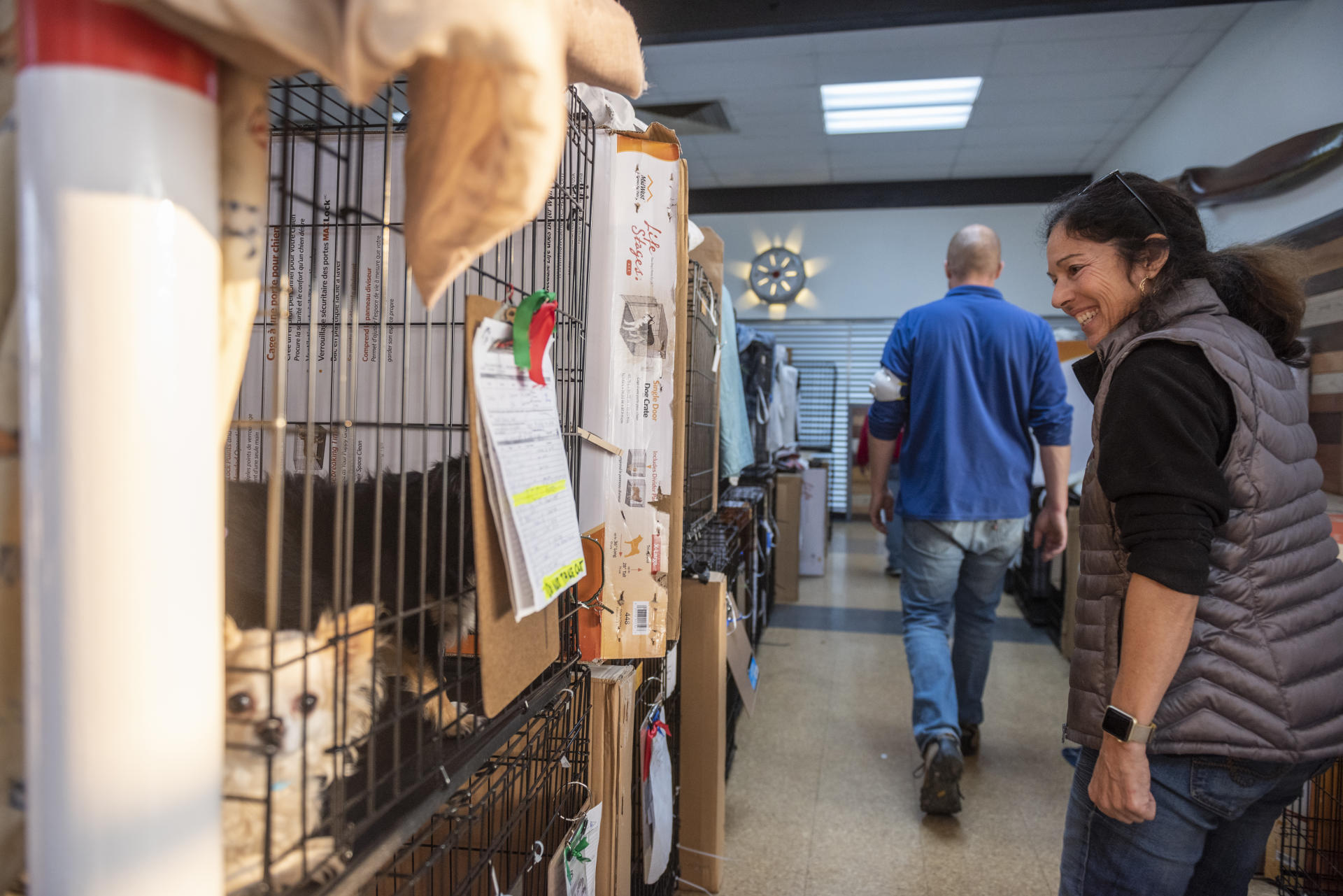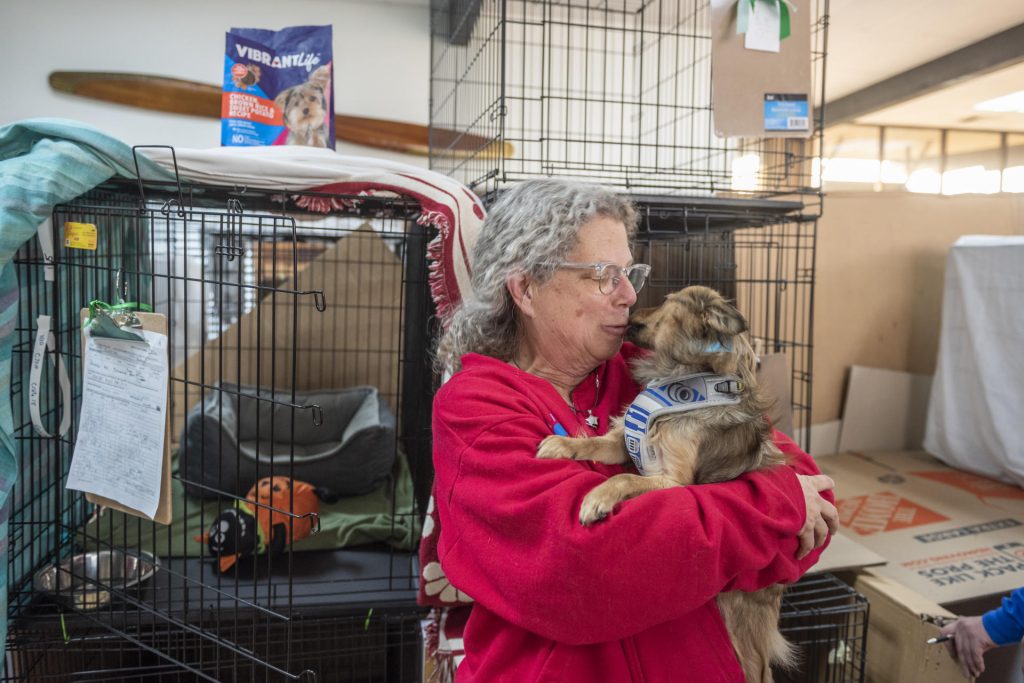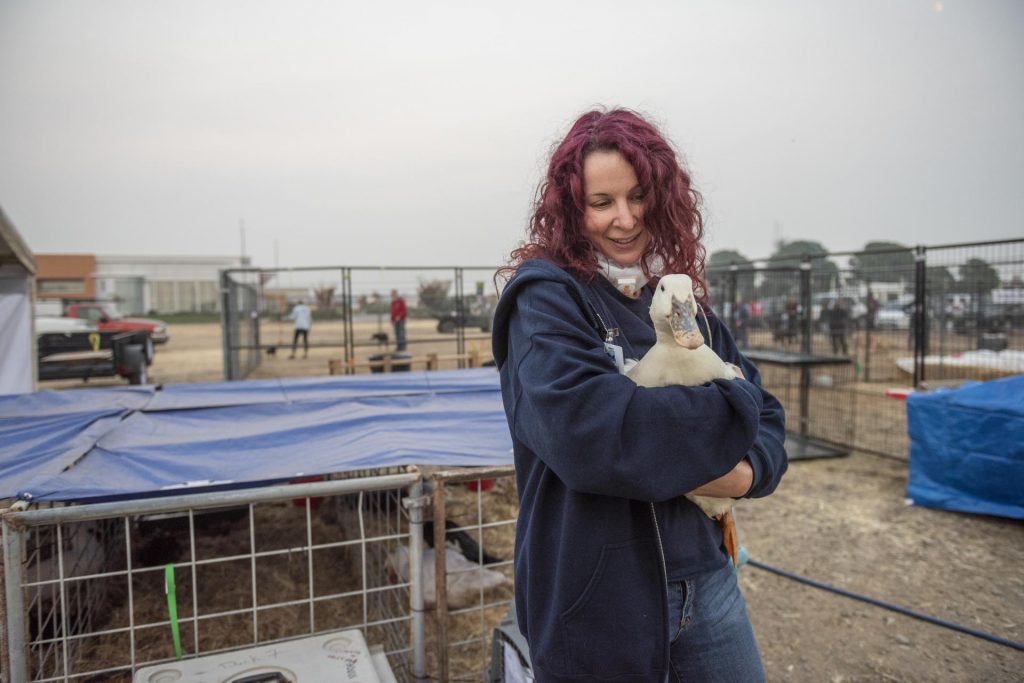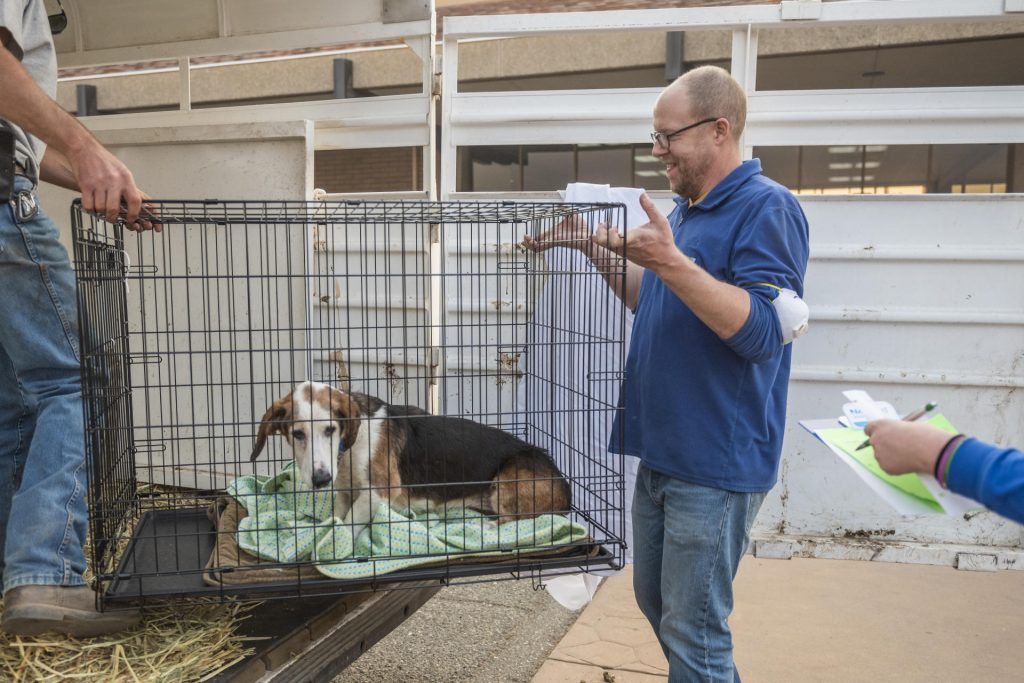Faculty Act to Care for Animals

CSU Chico Associate Dean Deborah Summers (right) volunteers with the North Valley Animal Disaster Group that tend to small animals at the Chico Municipal Airport terminal after removing at risk and injured animals from the devastation consumed by the Camp Fire that continues to impact the area on Sunday, November 18, 2018 in Chico, Calif. (Jason Halley/University Photographer/CSU Chico)
It was an oddly quiet night in the Chico Municipal Airport terminal.
Days after the Camp Fire, dozens of rescued dogs had been transported to a new shelter location and only a few remained. Lullaby music was playing softly on someone’s cell phone, and Jeanne Clark settled in with a few of the more sensitive dogs in a side room.
“I was feeding them, talking to them, petting them and, if I’m honest, having a good cry,” she said. “It was so peaceful. I thought this is what I want to feel. That was the feeling we all wanted, for someone to play a lullaby and for us to rest.”
The English professor had been at the emergency animal shelter established by the nonprofit North Valley Animal Disaster Group (NVADG) for days on end, putting her longtime skills in border collie rescue and fostering to work wherever she could. In addition to the tens of thousands of people who were displaced by the Camp Fire when it blazed through Butte County on November 8, more than 2,000 dogs, cats, rabbits, birds, and other pets had lost their homes or were separated from their owners.

Small animals were taken to the Chico Municipal Airport, where they were housed in the main terminal and jet hangars. Caring for hundreds of animals required ample effort by volunteers, and biological sciences professor Becky Brunelli was encouraged to see many fellow faculty out there, whether affiliated with official groups or just tapped by trusted colleagues to help.
“Our Chico State community is already close and seeing them all going out there and helping is really rewarding,” she said, noting volunteers cleaned cat cages, prepared duck pens, and washed dog crates, among many other responsibilities.
During the Oroville Dam crisis and Wall Fire, Brunelli, who earned her PhD in animal behavior, wanted desperately to help with rescue efforts but lacked the official training. So this spring, she enrolled in the North Valley Animal Disaster Group weekend course, never anticipating her first major aid project would be so major and so close to home.
When the call came on the day of the fire, she grabbed her uniform and hit the road.
“I’ve been working every waking hour since,” she said earlier this week, 34 days after the fire began. “I want to see this through to the end.”
Brunelli’s first few days were filled with animal intake, organizing care teams, helping people locate their animals, and serving as a liaison between volunteer groups. She eventually switched to managing the pet reunification website and is now searching for tools to help owners reunite with their cats and dogs.
“They were sleeping in someone’s bed at night or running around in a yard, and now they are in a shelter,” she said. “The animals are confused. They don’t know what is going on, and your heart hurts for them. You want to give them the best care you can.”

It’s readily apparent from animals’ well-manicured nails, nicely groomed coats, and how they respond to humans that many came from well-loved homes. Brunelli’s greatest highlight of the last few weeks was when a man who had been evacuated from Magalia was reunited with his 14 dogs, who he had to leave behind because he didn’t have a truck to transport them.
Finally face to face with his dogs again, he began crying and hugged the volunteers, telling them stories about each and every dog.
“My heart is broken 1,000 times every day by these stories of these people and their loss,” Brunelli said. “They just want to have their cat and their dog, a sense of home. It’s the only thing they have left. I see the animals in the shelter every day and I just want them back with the people that they love.
“It’s the hardest thing I have ever done in my life.”
English professor Chris Fosen said the work was also incredibly rewarding. Sometimes his tasks were as simple as making copies, using his strength to help carry crated animals, or ensuring that a dog’s paperwork stayed with them as they were transferred to the Richvale shelter, so that their record of diet, medication, and behavior went with them.
“It was the most mundane,” Fosen said. “But you were helping because you were making sure things ran smoothly.”

One of Clark’s top priorities was to help keep the dogs calm and not triggered by emotion or motion past their crates. She also created a transport list for the worst-burned animals, created an isolation room for a litter of six puppies, and one night when 11 badly burned, hypothermic cats came in, she creatively worked to find a way to keep them warm.
“You just do whatever was in front of you to do,” she said.
She is now working on an inventory of unclaimed and claimed animals that are still being sheltered. Her hope is to find foster or permanent homes for those that need them, and do whatever she can to ensure owners who have lost their homes don’t also have to lose their pets because they can’t find adequate housing.
In the more challenging moments, she turns to memories of watching dogs go home.
“You have to pay attention for those small moments because the ones that are full of grief and suffering are huge,” she said. “People say in rescuing, who is rescuing whom? Taking care of the dogs took care of me.”


